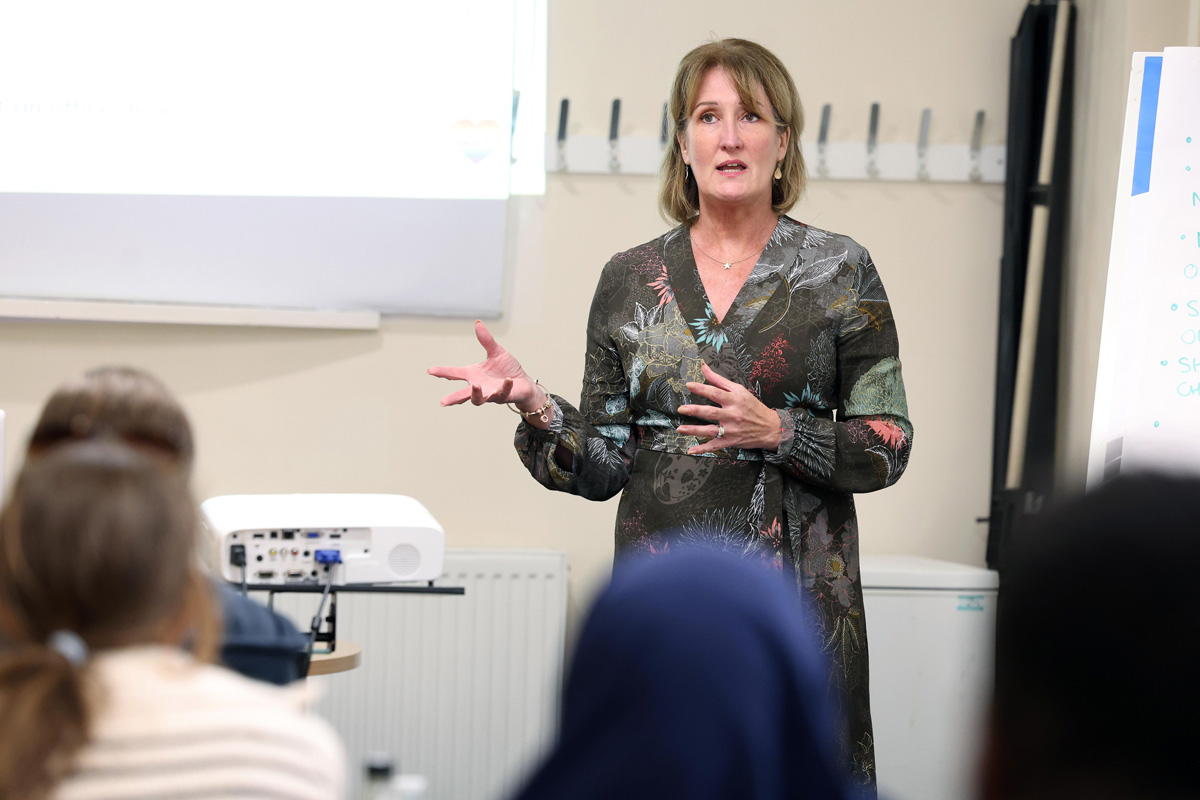A vision for Further Education in Wales

Since taking up the role of Minister for Education and Welsh Language last year, I have seen first-hand the huge contribution the further education sector makes to Wales.
I’ve seen how the sector reacted to the trials and tests of the pandemic, putting learners at the centre of the response, recognising their needs, helping them stay motivated, continuing their education or training and helping them progress to the next stages of their lives.
Throughout the last two years, our common interests and values, our shared long-term goals, have remained clear. We are all striving for an education system that enables all our students to achieve their potential, but also an education system that enriches our civic lives and our communities.
The Welsh Government and the FE sector are currently working together on the most far-reaching reforms to post-16 education our nation has seen. The reforms in our Tertiary Education and Research (TER) Bill are the underpinning for a post-16 sector which is fit for the future in its funding and regulation. But this is not the totality of our vision for further education in Wales.
The context for that vision is a radically changing economic and social landscape. The pandemic, Brexit, climate change and technological transformation are all significant challenges. Colleges are at the heart of our response, as an economy and a society.
The strategic partnership between government and our education sector is central to meeting these challenges and I would like to deepen that relationship still further.
Over the last two years, five values and approaches have exemplified the sector to me: learner focus, collaboration, adaptability, wellbeing and resilience, and local leadership. As we look to the future, these values need to help shape our common vision for further education.
Learner focus
At the heart of everything we do is the need to ensure our students gain the skills and qualifications they need to flourish and the ability to progress seamlessly along the range of qualification levels.
The FE sector is crucial to creating the entrepreneurs and the skilled workforce of the future. A sector ensuring access to the right skills, at the right time, responding quickly and flexibly to labour market intelligence in a changing economy.
As our economy changes, our education system in Wales must change. Whether in response to changes to VQs in England or ensuring we have a clear and coherent post-16 progression pathway from our new Curriculum for Wales.
We are going to need clear and coherent post-16 progression pathways from the new curriculum. The design of a new curriculum beyond 16 will be a shared responsibility of the Welsh Government and the new Commission.
I am expecting to receive a report from Estyn, the education and training inspectorate, in the early summer, looking at the availability and quality of the current curriculum offer. That will enable us to take forward a broader review of the local curriculum offer for 16 – 19 learners and support our first cohort of new curriculum learners entering post-16 settings from 2027.
We also need to significantly expand the range of made-for-Wales VQs to meet the needs of our learners and our economy. We will review the current offer of vocational qualifications in Wales and use the findings to bring forward reforms. We are working with Plaid Cymru on this and we will want to make sure that no learner in Wales is disadvantaged by reform being driven by the UK government.
Increasing the number of people who can learn through the medium of Welsh is also a priority, to help people use Welsh in the work place and beyond, which is crucial to our aim of a million Welsh speakers by 2050. We are addressing this challenge, by increasing support for learners and staff, including the commitments in our Co-operation Agreement with Plaid Cymru.
We all know the extraordinary power of education to change lives for the better. I want Wales to be a nation of second chances, a nation where it is never too late to learn.
My long term vision is a universal right to lifelong learning and to give every citizen the chance to re-boot their career in adult life.
We know this is a challenge. 24% of adults are without a Level 2 qualification and almost half of adults from the lowest socioeconomic groups have not received any training since they left full-time education. We have ambitious targets to reduce the numbers of working-age adults with no qualifications to below 5% and ensure 75% are qualified to at least Level 3 by 2050.
We know that difficult funding choices have often been most keenly felt in this area in the past. Our new Bill will place a duty on the new Commission for Tertiary Education and Research (CTER) to secure proper facilities for relevant education and training for eligible adults – a big step forward in adult provision, backed up by funding. The next two years are going to be crucial to building the capacity we need to deliver this commitment.
Collaboration
One of the principles underlying the Tertiary Education and Research Bill is that at a system-wide level, we can do more to meet the needs of learners by providers operating within a coherent, complementary ecosystem. A collaborative sector is crucial if we are to achieve our objectives, both by working together within and with others, be that with industry, schools, universities, local authorities or the Welsh Government.
We are already seeing some excellent examples between FE, HE and industry, creating opportunities for all, including in advanced manufacturing, construction, green energy, transport, digital – showing how we can develop new strategic pathways that focus on both current and future needs. Be it hub and spoke delivery, shared campuses or blended learning, the focus must always be on supporting the learner’s seamless journey.
The task now is to create a strategic habit of collaboration, looking at both long-term trends and the capacity to respond nimbly to more immediate needs.
To take an example of how this can be done successfully, see our Personal Learning Accounts. The newly funded HGV licences were delivered within weeks of announcing the funding, putting Wales in a strong position to bridge the skill and workforce gap swiftly.
My challenge to the sector is to use this approach to influence mainstream provision in the same way, to not only react to today’s market failures, but to pre-empt the needs of tomorrow.
Adaptability
We live in a world where change is the only constant. FE sits in the mid-point of the Venn diagram between a changing economy and change in educational provision.
How people learn, what they want to learn and when they want to do so is changing rapidly, driven by digital transformation. This is not new territory – it’s been a feature of learning post-16 for some time. But what is new is the breadth, depth and the needs of learners and staff.
The pandemic has transformed education itself. The digital college model offers opportunities for increased personalisation of learning, helping fit into students’ lives, rather than the other way around.
The use of digital tools and technologies is a natural part of a learner’s wider learning journey, and I want to see our learners equipped with the digital skills and capabilities they need to succeed.
Wellbeing and resilience
One of the most important things education can do is help learners become more resilient, so that they can cope with adversity and change. I know a lot of colleges are doing innovative work in this area.
I also recognise how vitally important it is both for the development of the workforce and the resilience of the sector for us to support lecturers in their professional and career development.
Four crucial pieces of work to support the FE profession
Over the course of the next 12 months, we will take forward four crucial pieces of work to support the profession:
1. Professional Learning Plan
Firstly, we will develop a professional learning plan for the teaching workforce which will bring together a range of training, advice and guidance for staff at all levels to develop their careers and professional lives. We will work with the sector to design a core package of CPD, with a focus on improving digital skills. A digital offer will be piloted, before being rolled out from the summer onwards.
2. Initial Teacher Education Review
Secondly, we will be reviewing Initial Teacher Education for the sector, determining the impact and effectiveness of the current qualifications and incentives and what reforms may be needed.
3. £1M Knowledge Transfer Project
Thirdly, we will be taking forward a knowledge transfer project, bringing expertise into the sector to help our teachers learn from some of the highest skilled practitioners around. The programme promises to increase the learner’s knowledge and learning experience in subjects such as digital, green skills, retrofit construction and engineering. We have made available £1m within this financial year and we will ensure that any learning from the programme is shared and its impact evaluated.
4. Improved Workforce Links
Finally, we are also looking creatively at ways to help improve workforce links with industry to ensure our teachers and assessors retain and hone their professional skills and expertise.
A career in the post-16 sector can be incredibly rewarding, so we want to raise the profile of the profession and highlight its opportunities. At the end of this month we will be launching a recruitment campaign to raise awareness of the wide range of rewarding careers available. The aim is to entice new entrants, be they recent graduates, experienced tradespeople or professionals, while also appealing to retired practitioners.
Local leadership
We have seen so clearly in the last two years the importance of ‘place’ in the wellbeing and economic health of people. The role of colleges as anchor institutions in their communities and their local economies is increasingly important.
Colleges have a reach through their physical premises, workforce, procurement capacity, skills development, their networks of business and industry contacts, and institutional leadership roles which can make a really significant impact in most local areas.
In 2017, a Colegau Cymru report suggested the economic impact of FE colleges in Wales to the local business community was £4 billion each year. Since then we have seen a surge in interest in the strengthening of local economies.
So we will work with the sector to support the work of colleges as anchor institutions in local economies, as well as realising the new focus on civic mission which will be a sector-wide priority when our Bill becomes law.
There is no doubt we are living in times of great change and challenge, but I am excited about the years ahead.
The sector exemplifies the practical, entrepreneurial instinct we now need.
If we remain adaptable, collaborative, if we focus on our resilience, on leading in our communities and putting the needs of the learner at the heart of all we do, we will succeed in turning these challenges into opportunities.
Jeremy Miles, Minister for Education and Welsh Language
Have you checked out Jeremy’s April 2022 article on a Vision for Lifelong Learning in Wales?











Responses